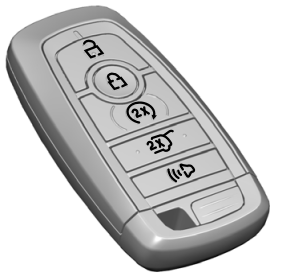Ford Explorer: Seatbelt Systems / Diagnosis and Testing - Seatbelt Systems
Symptom Chart(s)
Preliminary Inspection
Diagnostics in this manual assume a certain skill level and knowledge of Ford-specific diagnostic practices.
REFER to: Diagnostic Methods (100-00 General Information, Description and Operation).
Before diagnosing or repairing the seatbelt system, inspect the following items:
- Seatbelt webbing integrity (torn, frayed, cut or stretched)
- Seatbelt buckle and tongue assembly (latching and release, foreign debris)
Symptom Chart: Seatbelt System
Symptom Chart
| Condition | Action |
|---|---|
| The seatbelt warning indicator does not operate | GO to Pinpoint Test A |
| The seatbelt warning chime does not operate | GO to Pinpoint Test B |
| The seatbelt retractor webbing does not extract or exhibits excessive pressure on the occupant during use | GO to Pinpoint Test C |
| The seatbelt retractor webbing does not retract or has excessive slack during use | GO to Pinpoint Test C |
| The Belt-Minder® feature is inoperative | GO to Pinpoint Test D |
| The seatbelt tongue is rotated on the seatbelt webbing | GO to Pinpoint Test E |
| The seatbelt webbing is twisted at the seatbelt guide | GO to Pinpoint Test E |
| The seatbelt webbing is dirty or soiled | GO to Pinpoint Test E |
Pinpoint Tests
.jpg) PINPOINT TEST A : THE SEATBELT WARNING INDICATOR DOES NOT OPERATE
PINPOINT TEST A : THE SEATBELT WARNING INDICATOR DOES NOT OPERATE|
Normal Operation and Fault Conditions Turn the ignition on and monitor the airbag warning indicator after the IPC proves out.
Possible Sources
|
| Diagnostic steps are not provided for this symptom or DTC. REFER to: Diagnostic Methods (100-00 General Information, Description and Operation). |
.jpg) PINPOINT TEST B : THE SEATBELT WARNING CHIME DOES NOT OPERATE
PINPOINT TEST B : THE SEATBELT WARNING CHIME DOES NOT OPERATE|
Normal Operation and Fault Conditions Turn the ignition on and monitor the airbag warning indicator after the IPC proves out.
Possible Sources
|
| Diagnostic steps are not provided for this symptom or DTC. REFER to: Diagnostic Methods (100-00 General Information, Description and Operation). |
.jpg) PINPOINT TEST C : SEAT BELT RETRACTOR CONCERNS
PINPOINT TEST C : SEAT BELT RETRACTOR CONCERNS|
Normal Operation and Fault Conditions The seatbelt retractor webbing does not extract or exhibits excessive pressure on the occupant during use
The seatbelt retractor webbing does not retract or has excessive slack during use
Possible Sources
|
| Diagnostic steps are not provided for this symptom or DTC. REFER to: Diagnostic Methods (100-00 General Information, Description and Operation). |
.jpg) PINPOINT TEST D : BELT-MINDER® CONCERNS
PINPOINT TEST D : BELT-MINDER® CONCERNS|
Normal Operation and Fault Conditions Using the diagnostic scan tool, verify the Belt-Minder® feature is activated.
Possible Sources
|
| Diagnostic steps are not provided for this symptom or DTC. REFER to: Diagnostic Methods (100-00 General Information, Description and Operation). |
.jpg) PINPOINT TEST E : SEAT BELT WEBBING CONCERNS
PINPOINT TEST E : SEAT BELT WEBBING CONCERNS|
Normal Operation and Fault Conditions The seatbelt tongue is rotated on the seatbelt webbing
The seatbelt webbing is twisted at the seatbelt guide
The seatbelt webbing is dirty or soiled
Possible Sources
|
| Diagnostic steps are not provided for this symptom or DTC. REFER to: Diagnostic Methods (100-00 General Information, Description and Operation). |
 Description and Operation - Seatbelt Systems - System Operation and Component Description
Description and Operation - Seatbelt Systems - System Operation and Component Description
System Operation
Emergency Locking Retractor (ELR)
All
retractors have an Emergency Locking Retractor (ELR) mode, which is a
vehicle-sensitive feature designed to activate and lock the seatbelt ..
 General Procedures - Locked Seatbelt Retractor Releasing
General Procedures - Locked Seatbelt Retractor Releasing
Repair
NOTE:
If the seatbelt webbing does not extract from the seatbelt
retractor from the stowed position, this may be due to a normal
condition which happens when the seatbelt retracts at a hig..
Other information:
Ford Explorer 2020-2025 Service Manual: Removal and Installation - Trailer Module (TRM)
Removal NOTE: Removal steps in this procedure may contain installation details. NOTE: This step is only necessary if the TRM is being replaced. Using a diagnostic scan tool, begin the PMI process for the TRM following the on-screen instructions...
Ford Explorer 2020-2025 Service Manual: Removal and Installation - Power Liftgate Motor
Removal NOTE: Removal steps in this procedure may contain installation details. Remove the liftgate trim panel. Refer to: Liftgate Trim Panel (501-05 Interior Trim and Ornamentation, Removal and Installation). Remove the D-Pillar trim panel...
Categories
- Manuals Home
- 6th Generation Explorer Owners Manual
- 6th Generation Explorer Service Manual
- Automatic Transmission - 10-Speed Automatic Transmission – 10R60
- Removal and Installation - All-Wheel Drive (AWD) Module
- Removal and Installation - Liftgate Trim Panel
- New on site
- Most important about car
Intelligent Access Key
Note: You may not be able to shift out of park (P) unless the intelligent access key is inside your vehicle.


.jpg) PINPOINT TEST A : THE SEATBELT WARNING INDICATOR DOES NOT OPERATE
PINPOINT TEST A : THE SEATBELT WARNING INDICATOR DOES NOT OPERATE